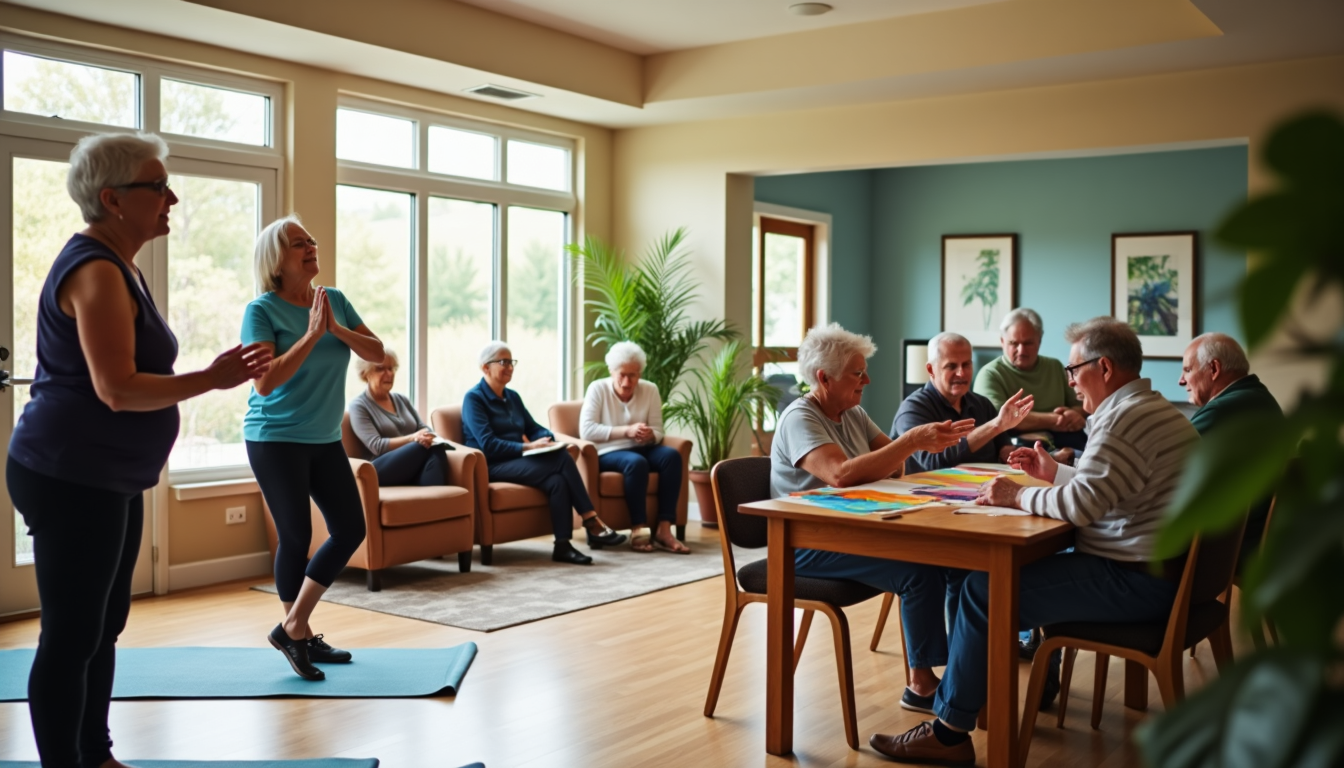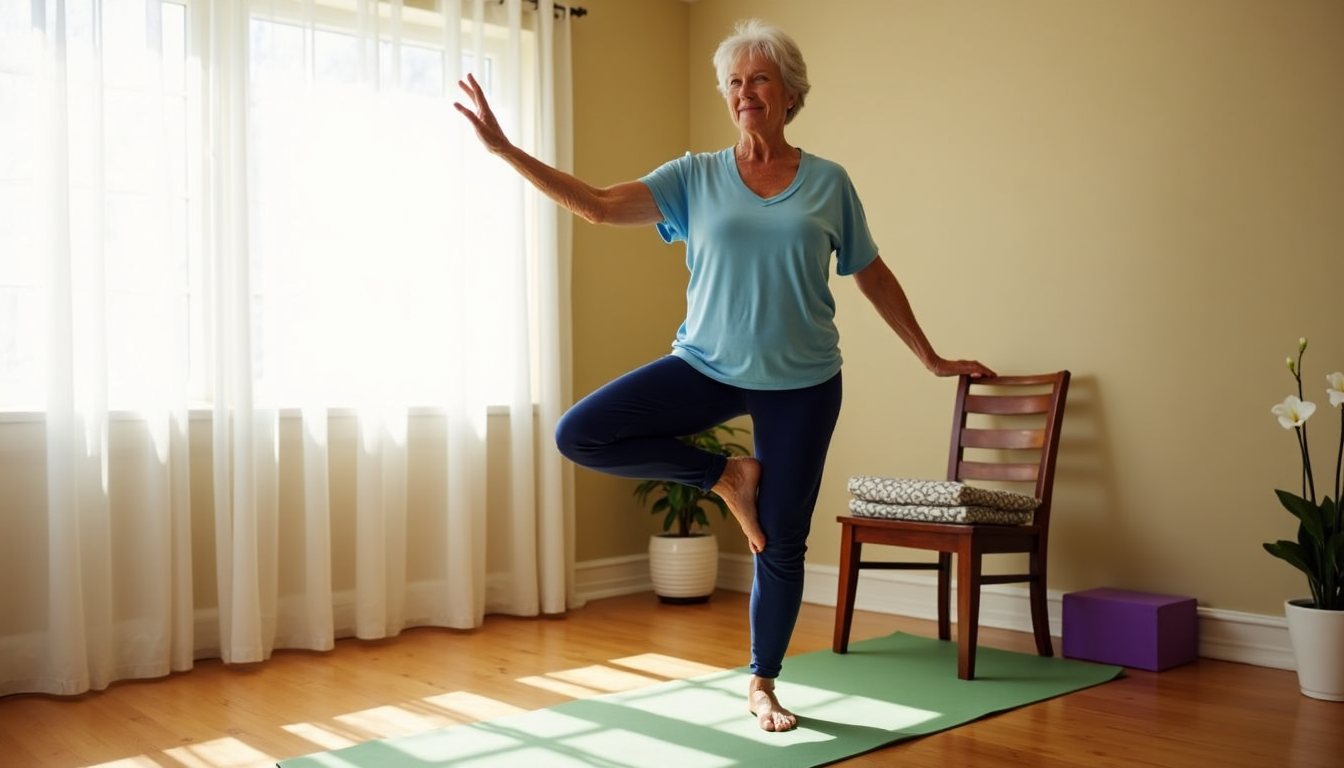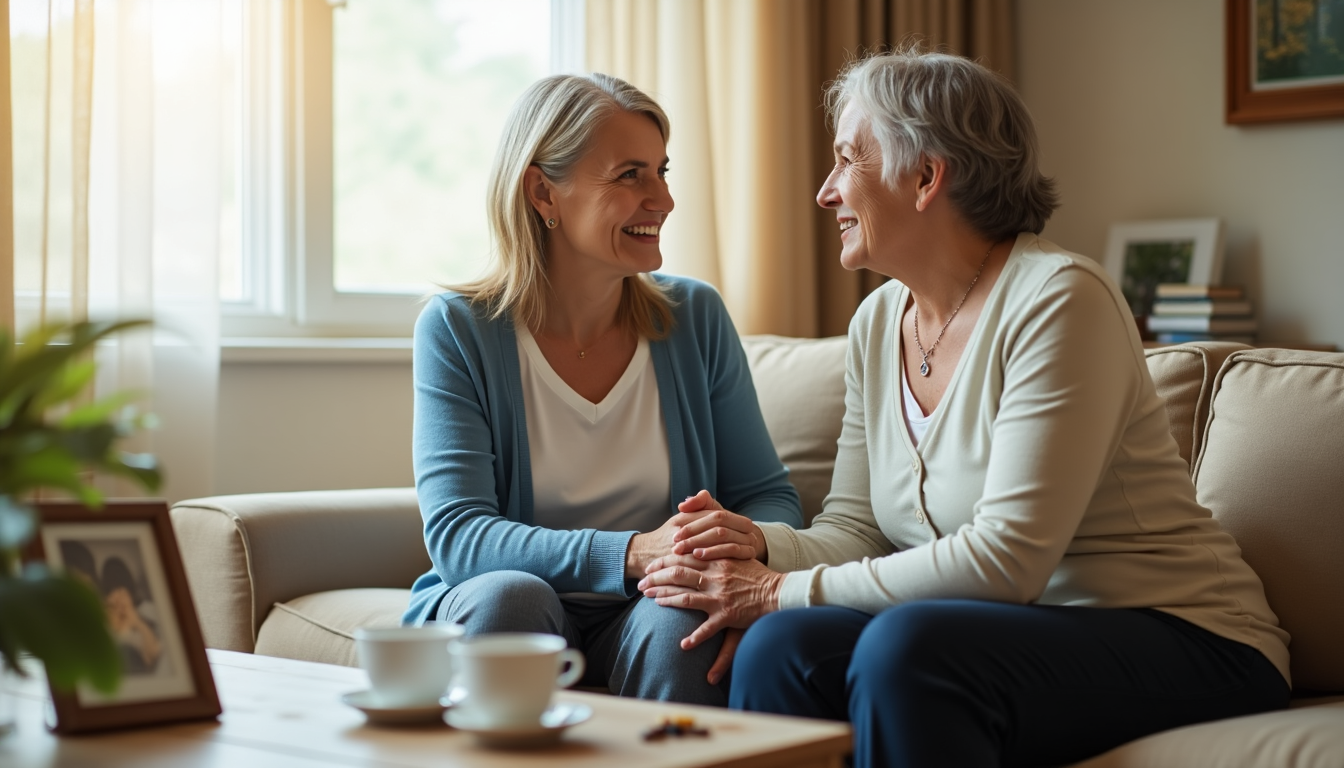Seniors who spend just a few hours socializing each day are happier, healthier, and significantly less likely to experience depression, according to recent research. Studies show that even adults in their 80s who maintain social connections demonstrate higher cognitive function and emotional stability than their isolated counterparts.
Finding opportunities for older adults to meet peers remains challenging for many. The Atlanta Regional Commission reports nearly 25% of Georgia’s senior population experiences social isolation. This poses serious health risks comparable to smoking 15 cigarettes daily, researchers say.
Social connection options range from community centers to specialized interest groups and online platforms. Many seniors discover that joining just one regular activity often leads to expanded social circles and improved overall well-being.
This guide explores various venues where seniors can meet other seniors, focusing on practical opportunities that accommodate different health needs, interests, and social preferences.
Finding Friends After Retirement: New Beginnings
Retirement creates opportunities for social connections beyond the workplace. Many retirees discover this transition allows them to build relationships based on genuine interests rather than professional necessity.
Joining retirement communities and groups
Retirement communities offer environments where seniors meet others in similar life stages. Research indicates residents in these communities experience improved cognitive function, enhanced physical well-being, and increased social engagement. Most communities schedule structured activities including movie nights, happy hours, game tournaments, and interest-based clubs that facilitate new friendships.
Independent living facilities commonly organize group outings to concerts, museums, sporting events, and local restaurants, allowing residents to bond while exploring their surroundings. Activity directors in these communities often introduce residents with shared interests to each other, making friendship formation more natural.
Volunteering opportunities for the newly retired
Volunteering builds connections while benefiting communities. AmeriCorps Seniors connects adults 55+ with service opportunities matching their interests and skills. Their data shows 84% of volunteers report stable or improving health after one year of service, while 88% who previously felt isolated experienced decreased loneliness.
Popular volunteer options include:
- Reading programs for children
- Delivering groceries to homebound seniors
- Companion programs that provide friendship to isolated older adults
- Community garden maintenance
- Administrative assistance at libraries or museums
Turning hobbies into social connections
Personal interests create natural pathways to friendship. Senior centers nationwide offer classes, clubs, and activities tailored to virtually every hobby imaginable. Activities ranging from arts and crafts to music, gardening, chess, computer skills, and book clubs create natural conversation starters with like-minded individuals.
For technology enthusiasts, organizations like Senior Planet teach digital skills in supportive environments while facilitating new friendships. Community centers and YMCAs host specialized social clubs connecting people with similar interests – from mahjong groups to day-trip enthusiasts.
The friendship formula: Studies suggest spending 40-60 hours together within the first six weeks of meeting transforms an acquaintance into a casual friend. Regular participation in enjoyable activities naturally accumulates these friendship-building hours while pursuing personal interests.
Where Do Seniors Go After Relocating: Building Local Connections
Relocating to a new area often creates social challenges for seniors, but many communities offer resources specifically designed to help establish new social connections.
Community centers and senior-specific programs
Community centers function as social hubs where seniors can access free or low-cost activities. Senior Programs at citywide community centers offer recreation and leisure activities including creative crafts, fitness classes, walking clubs, and special events for adults 55 and older. These centers typically provide daily hot meals, creating natural opportunities for socializing while addressing nutritional needs. Many centers organize field trips and cultural events, giving seniors chances to explore their new surroundings alongside peers.
Some programs provide transportation services within certain distances, removing barriers for seniors without personal vehicles. For those with health conditions, many centers offer fitness classes tailored to accommodate various mobility levels and medical needs.
Neighborhood associations and local events
Neighborhood associations help seniors integrate into new communities. These voluntarily organized groups enable residents to work together, creating a unified voice while enhancing living conditions in their neighborhoods. Research indicates participation in neighborhood associations correlates with increased bonding and linking social capital—essentially, better connections with neighbors and neighborhood organizations.
These associations regularly organize block parties and community events that facilitate socializing among residents of all ages. Studies show members who spend face-to-face time developing interpersonal relationships more likely continue their participation. Such interactions help combat isolation while giving seniors a sense of purpose in their new location.
Religious and spiritual communities
Religious communities provide substantial social support for many seniors outside family connections. Involvement in religious organizations represents the most common type of voluntary social activity among older adults. These communities offer both spiritual fulfillment and practical assistance through various programs.
Many faith-based organizations provide transportation to services, grief support groups, and intergenerational activities. Programs like Spirituality and Aging (S&A) groups help reduce depressive symptoms in older adults by strengthening a sense of meaning while fostering connectedness with others. These communities welcome members regardless of residency duration, making them valuable resources for newly relocated seniors seeking meaningful connections.
Socializing After Loss: Support and New Friendships
Loss of a loved one creates profound isolation for many seniors. Research shows this difficult period often leads to new social connections when bereaved individuals meet others with similar experiences.
Grief support groups that foster lasting connections
Grief support groups provide environments where seniors can discuss emotional, spiritual, and psychological aspects of loss with peers who understand. Participants at Seniors At Home frequently express relief in discovering they aren’t alone in their confusing emotions. These groups normalize grief experiences, creating what Rabbi Isaacson describes as “a surrogate family” that reduces isolation while building hope.
These connections often continue beyond formal sessions. Many participants choose to meet independently after completing structured programs. The Dinner Party organization, which facilitates monthly gatherings for grieving individuals, notes that “grief isn’t a problem that needs solving, but the loneliness that comes with it is”.
GriefShare offers 13-week support programs at thousands of locations nationwide, allowing seniors to join at any point during the cycle. The Compassionate Friends maintains over 500 chapters across the country, with both in-person and online support options.
Activity-based healing through shared experiences
Activity-based healing provides another pathway to new relationships. Senior Friendship Centers organize group trips, exercise classes, and game nights specifically designed to help bereaved seniors form connections while processing grief.
Volunteering offers meaningful opportunities, with hospice organizations regularly seeking new helpers for various roles. Simple activities like organizing card games or participating in community remembrance events provide therapeutic social interaction.
Studies confirm that group activities reduce isolation feelings while giving seniors a renewed sense of purpose. These shared experiences build mutual respect and empathy, creating environments where participants feel both validated and valued while developing new friendships.
Meeting Seniors with Similar Health Journeys
Health challenges create unique connection opportunities as shared experiences bring people together. Many seniors report that finding others navigating similar medical conditions transforms healthcare challenges into meaningful friendships.
Fitness classes designed for specific health conditions
Exercise programs tailored to specific health needs deliver both physical benefits and social connections. The National Council on Aging offers evidence-based fitness programs that improve arthritis symptoms, balance, and overall mobility. Programs like EnhanceFitness and Fit and Strong! combine flexibility, strength training, and aerobic activities designed for seniors with lower extremity osteoarthritis.
Moving For Better Balance offers a 12-week evidence-based group exercise program improving balance, muscle strength, and flexibility for those with stability concerns. Participants report improved mental health, reduced stress, and increased self-esteem beyond physical benefits. The supportive group setting naturally facilitates connections among seniors facing similar mobility challenges.
Online health communities with local chapters
National health organizations maintain online communities with local in-person chapters. The American Heart Association’s online community connects seniors managing heart conditions through forums and expert-hosted virtual events. The Parkinson’s Foundation similarly links individuals through discussion boards and support groups where members share experiences and build relationships.
The Center for Chronic Illness provides professionally-facilitated virtual support groups for conditions ranging from chronic pain to migraines at no cost. These groups meet on regular schedules, creating consistent opportunities for seniors to connect with others sharing similar health experiences.
Medical center social programs
Medical centers increasingly recognize social connection improves health outcomes and offer programs bringing patients together. Programs of All-Inclusive Care for the Elderly (PACE) provide comprehensive medical and social services to frail elderly individuals. These programs use interdisciplinary teams coordinating care that helps participants remain active in their communities rather than require nursing home care.
Local Councils on Aging connect older adults to mental health services and social support in their communities. Many hospitals maintain condition-specific support groups where seniors gain educational resources alongside friendship opportunities.
Conclusion
Social connections significantly enrich the lives of older adults, according to multiple studies. Research demonstrates that maintaining active social engagement during senior years benefits cognitive function, emotional well-being, and physical health.
The pathways for seniors to meet other seniors are numerous, spanning from retirement communities and volunteer opportunities to hobby groups and health-focused programs. Each venue offers distinct advantages based on individual preferences, mobility levels, and social comfort.
Community centers, religious organizations, and specialized support groups consistently report high levels of senior participation. These environments create settings where friendships develop naturally around shared interests and experiences.
Seniors who successfully expand their social circles typically begin with one or two regular activities aligned with personal interests, experts say. Many find that combining social engagement with health-focused programs or volunteer work delivers multiple benefits simultaneously.
Life transitions such as retirement, relocation, or loss of a loved one alter existing social networks but simultaneously create opportunities for new connections. Data shows seniors who remain open to new experiences and actively participate in community activities develop relationships that substantially improve quality of life.
Health researchers note that consistent social engagement correlates with reduced depression rates, improved cognitive function, and better management of chronic conditions among older adults. These findings underscore the importance of prioritizing social connection as a key component of healthy aging.
FAQs
Q1. What are some effective ways for seniors to meet new people? Seniors can meet new people by joining retirement communities, volunteering, participating in hobby-based activities, attending community center events, and joining religious or spiritual groups. These venues provide opportunities to connect with like-minded individuals and build meaningful relationships.
Q2. How can seniors socialize after relocating to a new area? After relocating, seniors can build local connections by getting involved in community centers, joining neighborhood associations, attending local events, and participating in religious or spiritual communities. These activities help integrate into the new community and foster new friendships.
Q3. Are there social opportunities for seniors with specific health conditions? Yes, there are many social opportunities for seniors with specific health conditions. These include fitness classes designed for particular health needs, online health communities with local chapters, and medical center social programs. These venues allow seniors to connect with others facing similar health journeys.
Q4. How can seniors cope with loneliness after losing a spouse or partner? Seniors coping with loss can find support and new friendships through grief support groups, activity-based healing programs, and volunteering. These opportunities provide a chance to connect with others who understand their experience and can offer mutual support.
Q5. What are the benefits of staying socially active for seniors? Staying socially active offers numerous benefits for seniors, including improved cognitive function, enhanced emotional well-being, and better overall health. Research shows that seniors who socialize regularly are happier, healthier, and less likely to experience depression.












